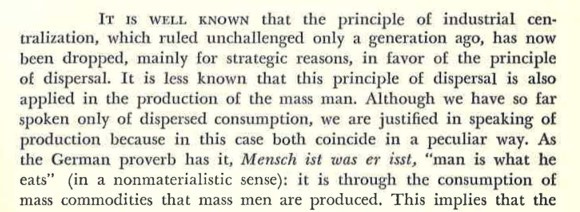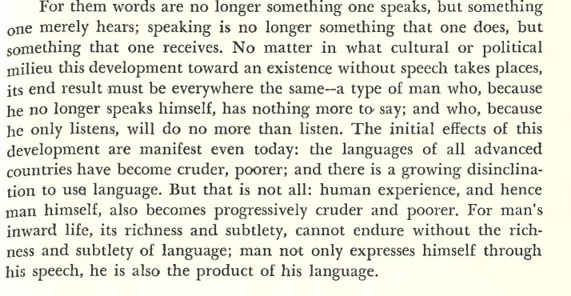In 1956, an obscure German philosopher named Günther Anders published a six-page PDF that predicted the terrifying future if society's dependence on technology continued to increase. Anders argued the marriage between technology and convenience would have disastrous consequences. He noticed a strange feature of the new technology of his time, Television, and predicted a radical shift in behaviour as a result.
The conclusions reached in Anders's paper look more ominous with each passing day. Since its publication, technology has become even more pervasive. Our hands are permanently attached to a smartphone and while these devices are convenient, this comes at a cost. They prevent us from interacting with the world around us and distract us from thinking. We spend our time taking part in one-way interactions reduced to distant observers. Is it too late for us to reverse this trend and reclaim our independence?
The threat posed by technology is now better understood but Anders identified it seventy years ago. Born to psychologists William and Clara Stern, Anders went on to study under luminaries such as Edmund Husserl and Martin Heidegger. He fled Nazi Germany and lived in exile in the United States before returning to Europe in the 1950s. During this time he married fellow philosopher Hannah Arendt, the author of “The Origins of Totalitarianism”. Though his first wife is more well known Anders was a prolific writer, publishing over 40 books and hundreds of essays. The inspiration for this piece was his work “The World as Phantom and Matrix”.
In the 1950’s cinema houses faced a dilemma. Films were being shown in the cinema requiring a physical location with substantial room to house an audience. The development of television and radio changed consumption habits and cinema was under threat. Now viewers didn't have to leave the comfort of their home. A choice of programmes were available on a greater scale and the unwitting consumer would have to own the means of distribution. Under this illusion of convenience consumers paid for the necessary equipment and space.
This is the first example of convenience threatening the social realm. During the film there may be little interaction between audience members it forced them to gather in one location. When the film ended an individual could talk with the other filmgoers and go on elsewhere together. This meant more socialising and had a positive impact on the local economy.
Jump forward to the modern day and this process is reversing. Everything that was once enjoyed on masse is now consumed by individuals. We interact with others less than ever before. Exhausted after a long day working, they take slump down onto the sofa to watch a film alone. We film every live spectacle and publish it online so there are less coincidental meetings. Rather than heading out to a restaurant they stay in and order takeaway instead. Fewer chance encounters create smaller friend groups and a vicious cycle of alienation. Even post film discussion has moved into online forums where we interact with anonymous avatars.
Anders original essay concerned the media but this trend is now prevalent across every industry.
Under the guise of convenience and leisure we have enabled a system that encourages more and more consumption. Once a family of four would have gone out together but now it is common to see them sat in four separate rooms of the house. It is conceivable that each will be watching something different on a different device while eating from a different restaurant. Anders feared everyone tuning in to the same broadcast night after night erased diverse thinking. Instead, it is our lack of interaction with the world outside the front door that has crippled us.
The remote places and people that exist on the screen are now more familiar than our neighbours. Anders recognised that the television had eroded the interactions around the dinner table. Now we have even displaced television in the typical family home. We have conditioned ourselves to believe this is normal and something we have chosen. The smart phone has accelerated this process and our role as a spectator has increased. This has created the passive voyeuristic society we see today.
Of radio, the other new technology of the time, he said “mass man” listens to conversations without participating. We listen to make us feel like we are not alone but we are just eavesdropping on another conversation. Radio was not on 24 hours a day but now you can spend all day engaged in similar activities. You can be on a voice call sitting and watching on mute, you listen to a podcast without speaking. You get bored and watch YouTube which seems like we a real interaction but we never speak. Even outside the home you sit drinking coffee and listen to the conversation of others. It is not hard to see how some people can spend their entire day without voicing a thought out loud. Words are something that we hear or type but don't habitually say. Insidious how sitting and watching in silence manifests in all aspects of behaviour. The inward life of man suffers unless we can speak freely and develop ideas through debate.
Events now come to us inside our homes. We discover local news through Facebook rather than talking to our neighbours. You can witness a car accident and check social media to find out what happened rather than stopping and getting out to help. When a fight breaks out there is no shortage of people filming but none rush to intervene. A loud explosion is the subject of online discussion by people huddled in separate homes. There are fewer spontaneous reasons for us to talk with our neighbours face to face.
The danger of a society where we witness everything through a screen is that it warps your sense of reality. Information comes to us second hand and cultivated by someone else. The individual is now an isolated audience for global propaganda. While the technology has changed since Anders warning we still do not know who to trust. Social media is full of instant video footage of natural disasters and global conflicts. This availability means we struggle more than ever to separate fact from fiction.
Anders was a proponent of being out in the world. He felt a key stage of maturity was when a young person went out to meet new people and visit strange places. Without this practical experience, they would remain naïve and ill-equipped to deal with life. This form of exploration is now harder to come by. The modern equivalent the gap year is a poor substitute. They visit the same tourist destinations as their peers and take few risks. A comfortable hotel room and air-conditioned planes mean they are never far from comfort. As the world becomes more uniform the novelty in the world decreases. Even for those that chase it find it harder to encounter the strange and unknown. The more people stay at home the more companies cater to them and build less in the real world.
The pandemic and enforced lockdowns reinforced this market. To combat the potential isolation of being perpetually at home, a cult of influencers sell to us through the screen. We have replicated something Anders noticed in the relationship between viewers and Hollywood actors. Their candid style on camera creates a sense of false intimacy that we crave as we are further alienated from people around us. This Pseudo familiarity influences us to buy things to replicate the lives we see on the screen. Any recommendations feel sincere which negates the difficulties of traditional advertising.
All these factors have combined to create a society of obsessionals. This term coined by the psychologist Jacques Lacan, described a personality type that endlessly delays gratifying their own desires. One way this manifested is the pursuit of knowledge at the expense of application. In the age of the internet this is a dangerous trait as you can forever seek out new ideas. We collate this deluge of information but never use it for anything. An obsessional deludes themself into thinking they have all the answers. Ask them and they know how to solve the problems with the economy or end the Ukraine conflict. They think themselves innate experts despite the lack of evidence. Deep down they hate the idea of failing after sincere effort so instead remain as spectators. The distractions of the modern world serve to placate their egos and keep them consuming.
Conclusion
The isolation of man through consumption shows no sign of slowing with the rapid advancement of AI and virtual reality. Both offer a new threat to the “real” and could create millions more who exist only at home as phantoms. These issues stem from choosing convenience as our highest virtue. There is no nobility in struggle for its own sake, but we have taken things too far towards comfort. This coupled with the dispersal of consumption has transformed you into a passive consumer. As a remedy many suggest cutting screen time, but a lack of interaction is more debilitating. Instead pursue friendships with people nearby that you can discuss ideas with.
There are other ways to combat this trend. It is about taking responsibility and taking on more challenges. Avoid the package holidays and recommendations from trip advisor. Hike the most difficult and inaccessible routes. Read books not found as a one click purchase on the Kindle store. Wherever possible attend events in person. Most importantly spend time cultivating your own ideas through writing and talking.
"Only 200 good men are needed to make a difference in a battle. They will sow chaos and confusion in the enemy ranks, and their example will inspire others to fight on. The rest is up to the gods."
Ernst Junger
We must return to the world.







